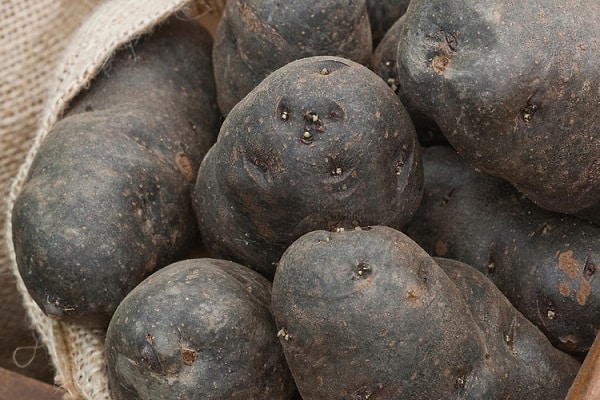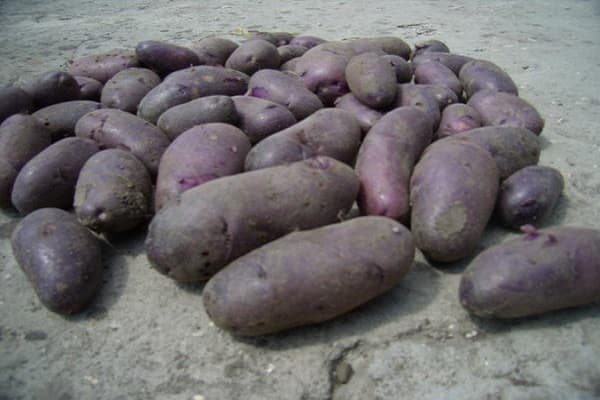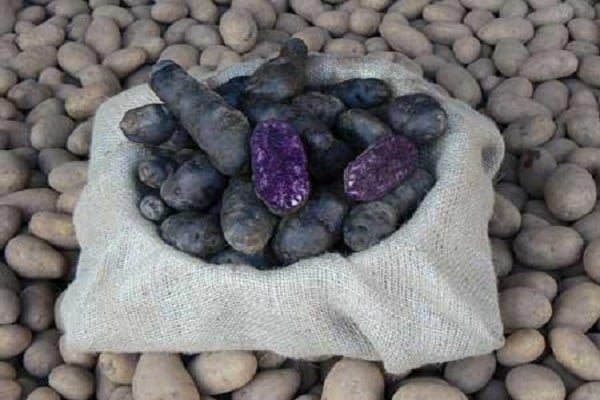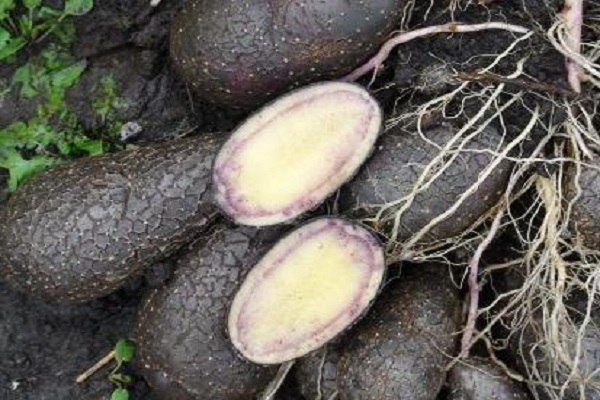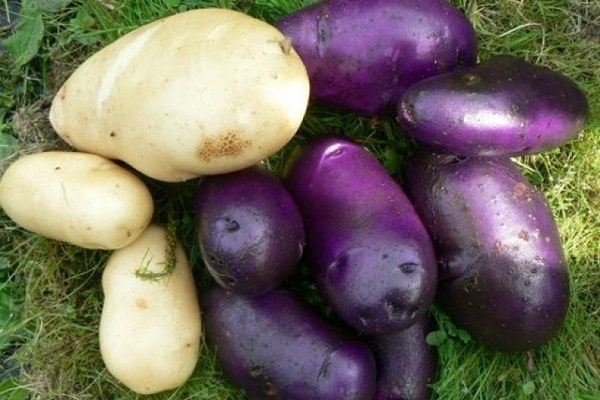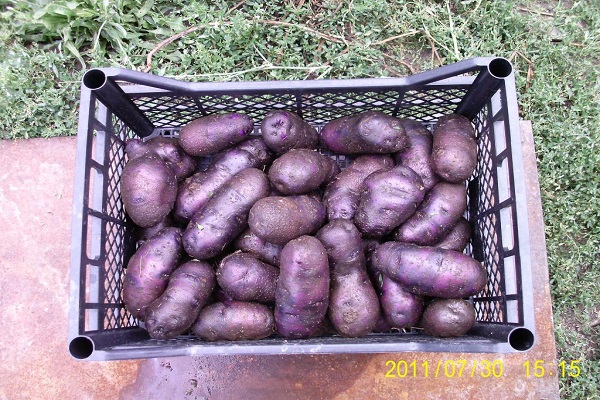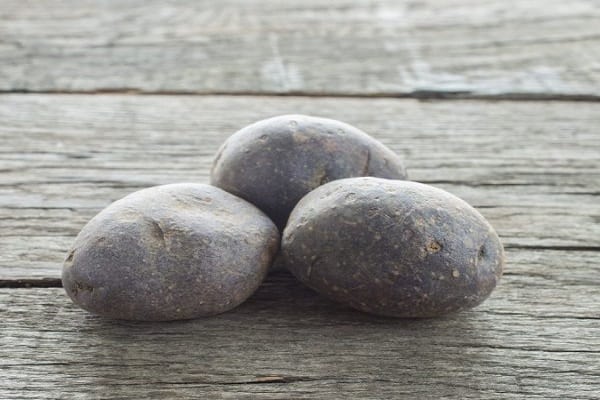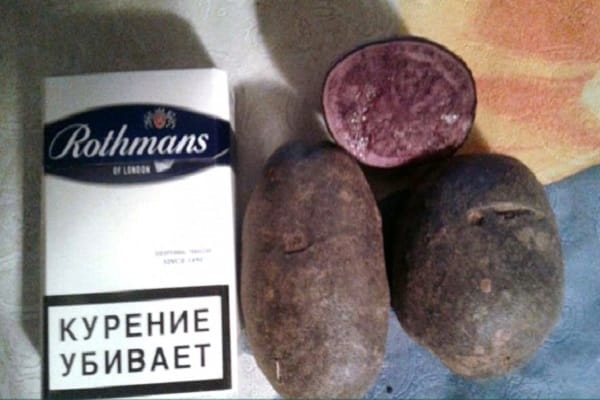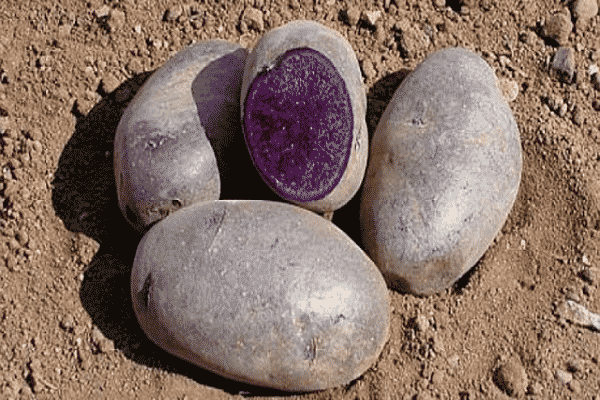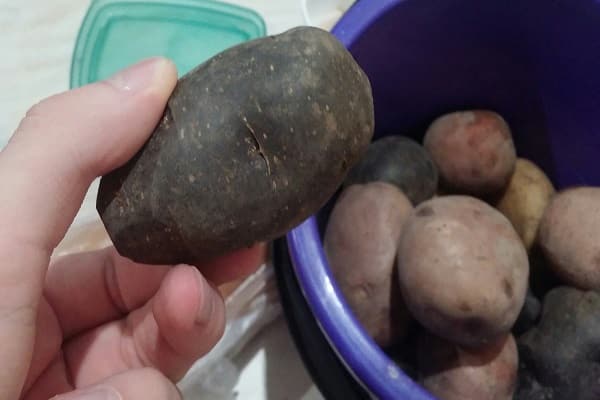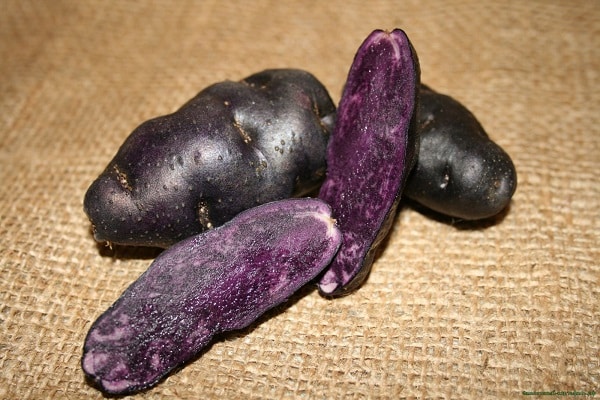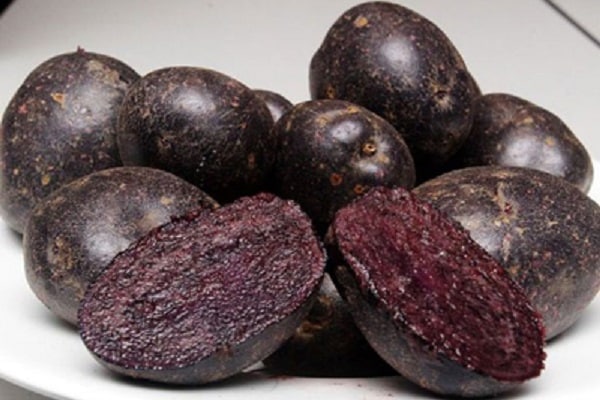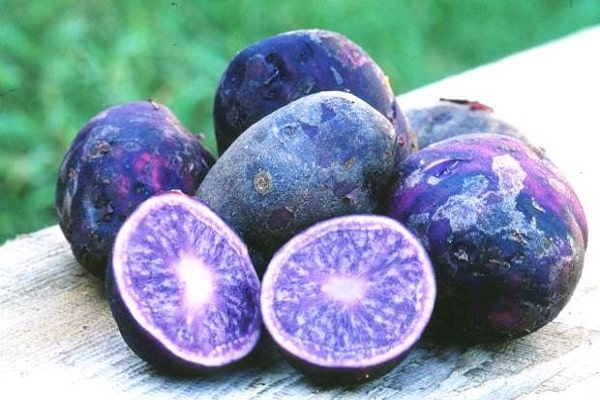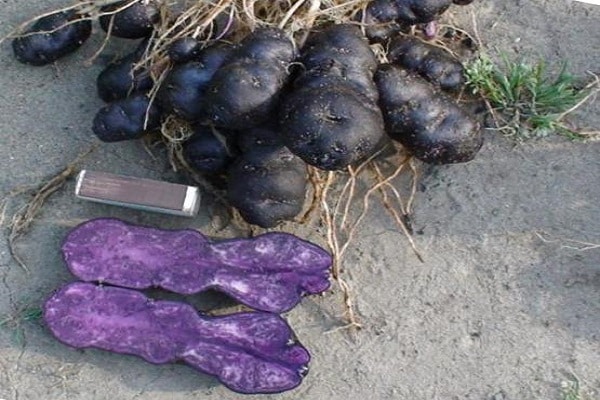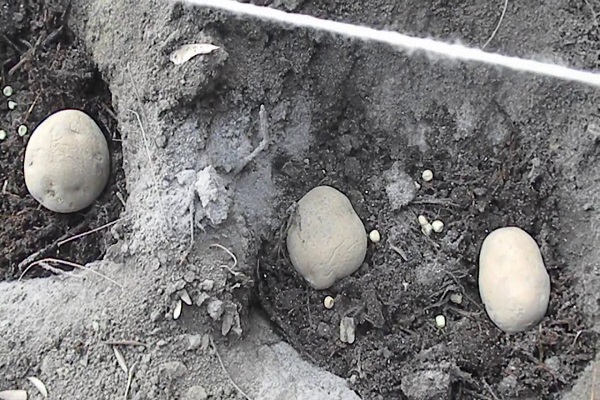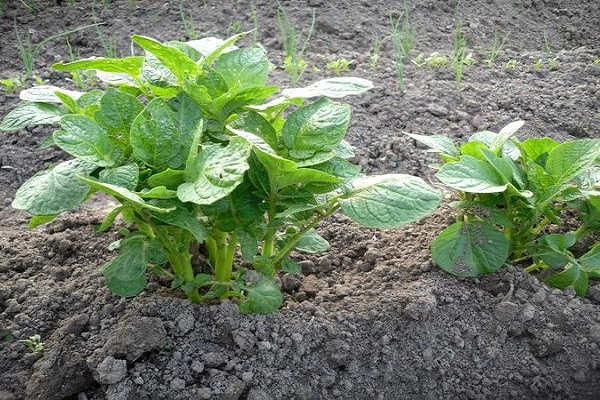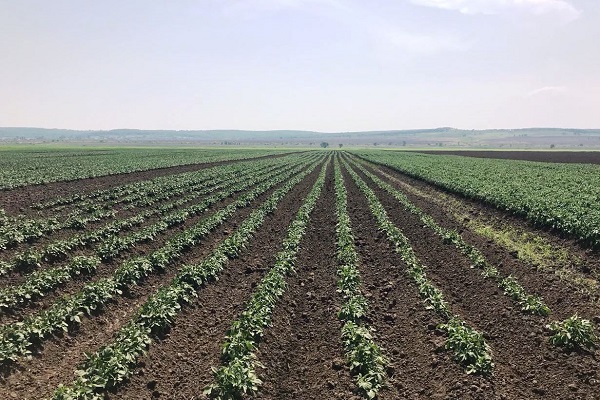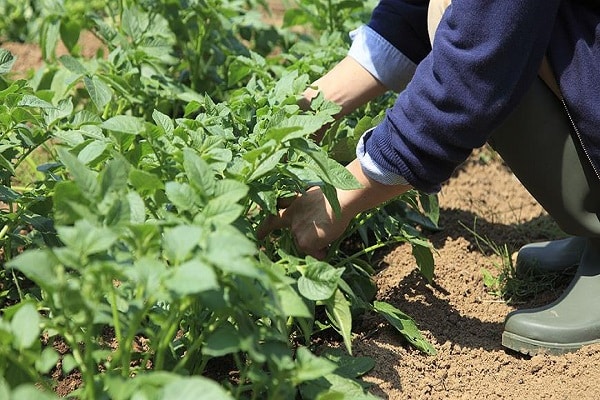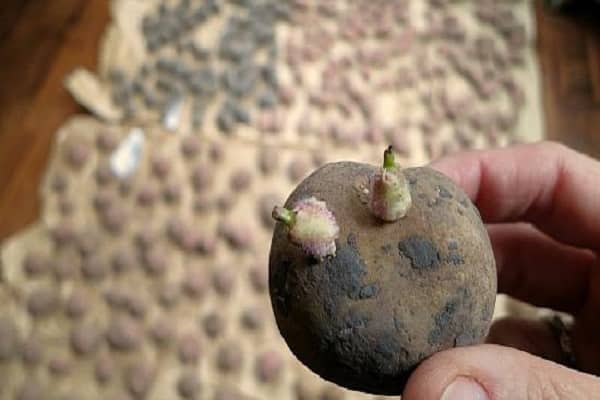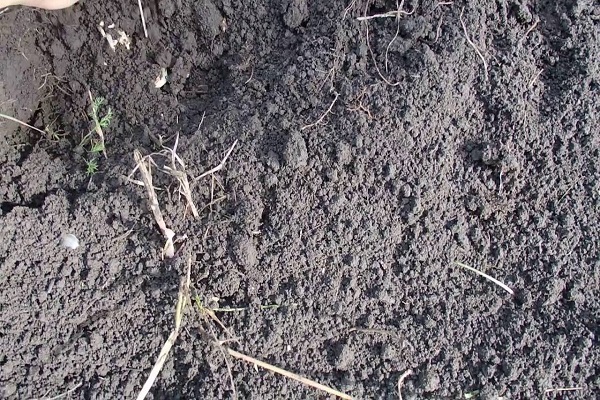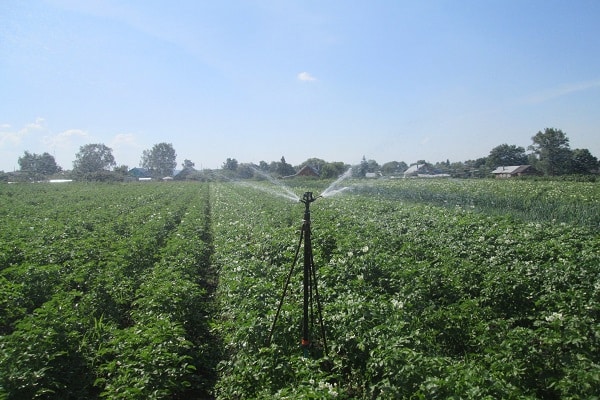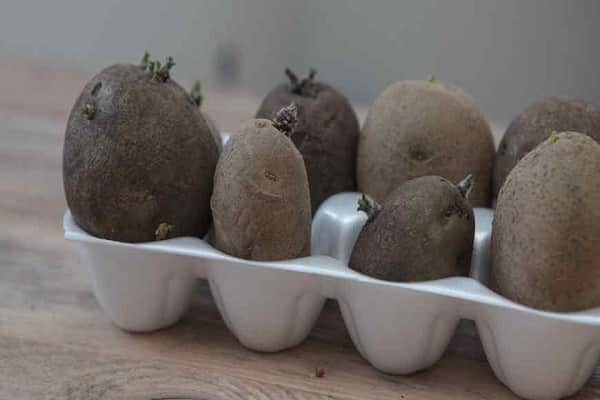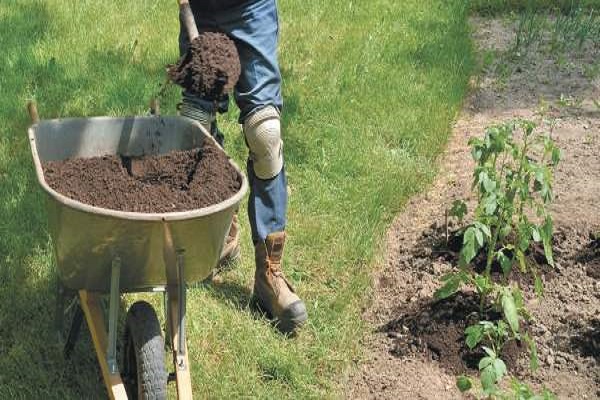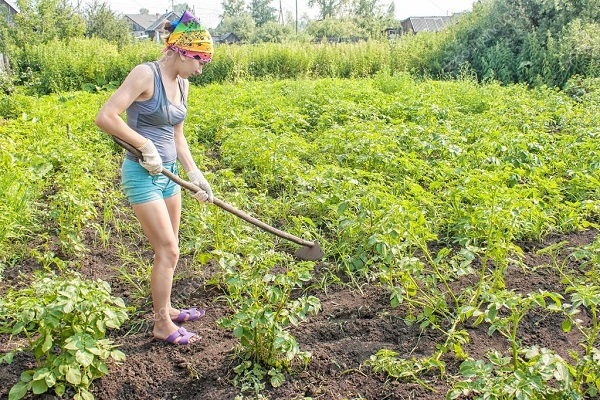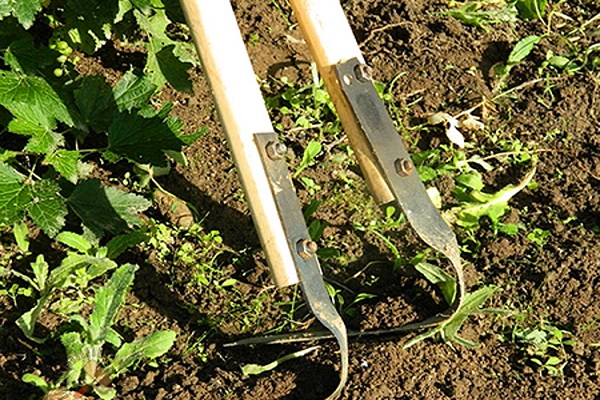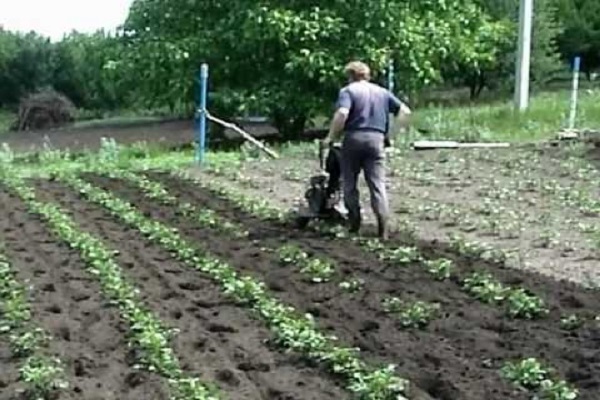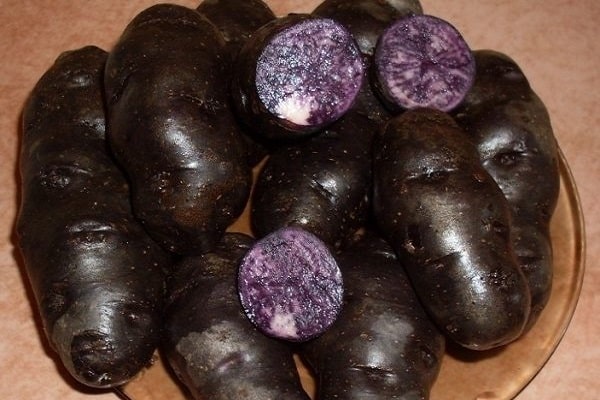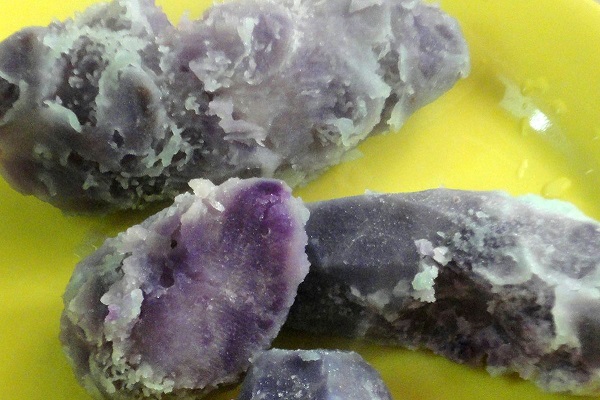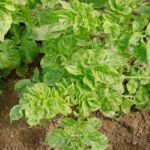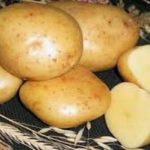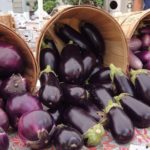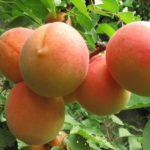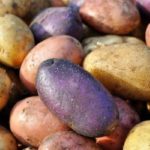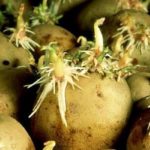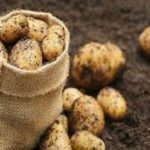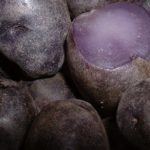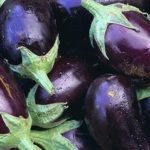Exotics on sites are not uncommon these days. Black potatoes are no exception. Summer residents, knowing about the beneficial properties of this type of crop, willingly grow various potato varieties.
- Origin
- Description of the variety
- Description of the fruit
- Description of the bush
- Advantages and disadvantages
- What does it taste like?
- Disease resistance
- Precocity
- Productivity
- Growing regions
- Distribution in Russia
- Varieties
- Chinese truffle
- Black woman
- Purple Peruvian
- Black Prince
- Purple Viking
- Scottish black variety
- Landing
- Deadlines
- Place
- Soil preparation
- Seed treatment
- Planting pattern and depth
- Features of care
- Watering
- Top dressing
- Weeding
- Loosening the soil
- Hilling
- Harvest and storage
- Eating
Origin
There is no single answer to this question. But most opinions agree that the birthplace of black potatoes is South America. Some researchers claim that this variety of crop appeared as a result of breeding work by scientists.
Description of the variety
There are many varieties of black potatoes, but they all share similar characteristics. Dark root vegetables, light aerial parts, thick skin of tubers and other characteristics. The height of the bushes, the length of the vegetable and some other characteristic features are different for each variety.
Description of the fruit
Externally, the skin is almost black, inside there is bright purple flesh with white veins. The shape is oblong or round depending on the variety, the taste is unusual. Rich in vitamins and antioxidants.
The potatoes take less time to cook than their white counterpart and have a nutty hue.
Description of the bush
Plant height reaches 50-65 cm, and higher depending on the variety. The bushes are erect, the stems are lush. In general, the plants are very similar in appearance.
Advantages and disadvantages
It is not possible to unambiguously determine the positive and negative properties of varieties. Each type has its own pros and cons.
But there are still common advantages:
- Unusual color, taste and appearance of root vegetables.
- The commercial quality of root crops is very good.
- If all requirements are met, it can be stored for a long time, maintaining its taste and excellent presentation.
- The vegetable has a set of useful substances characteristic only of varieties with black roots.
- Some varieties can tolerate heat.
- High immunity to diseases.
Flaws:
- Low yield compared to other varieties.
- These varieties are not suitable for complete sowing of plots; they serve only as supplements.
- Susceptible to some diseases.
Black potatoes are considered exotic vegetables.Therefore, they grow it more for pleasure than to ensure a supply of root crops for the winter.
What does it taste like?
As the description states, black potatoes have a distinct nutty flavor when cooked. Thanks to this, it is gaining recognition among summer residents who love to surprise their family and friends with unusual dishes. The root vegetable cooks faster than the usual white potato varieties. When cooked, it retains the purple hue of the vegetable.
Disease resistance
Field health of plants is an important criterion when choosing varieties for cultivation. The summer resident wants to have types of crops that do not require constant preventive treatment.
Black potatoes are immune to some diseases, depending on the variety. Also, depending on the species, it is affected by certain diseases.
Precocity
The ripening period ranges from 70-110 days. It all depends on the chosen variety
Productivity
The disadvantage and distinctive feature of black potatoes is their low yield. It is also different for all species, so you should pay attention to this when choosing.
Growing regions
Exotic types of crops are gaining popularity among summer residents. Regions for growing black potatoes are not limited by rigid boundaries. Many varieties are grown throughout the world.
Distribution in Russia
Russian summer residents love everything unusual, which is why the black tuber is known throughout the country. But they grow it as a supplement. Not trying to get the maximum harvest necessary to feed the whole family.
Varieties
Breeders offer the summer resident the most common types of crops that are popular in Russia:
- Chinese truffle.
- Black woman.
- Purple Peruvian.
- Black Prince.
- Purple Viking.
- Scottish black variety.
Having become familiar with the characteristics, the gardener chooses the most suitable type of crop for himself and his family.
Chinese truffle
Potato variety with an average ripening period of 75-85 days. The fruits are oblong, the flesh is purple. The skin is thick, which allows for excellent storage throughout the winter.
Black woman
A well-known variety among summer residents, it is distinguished by its early ripening, as it ripens in 70 days. Suitable for any type of use; during heat treatment it does not lose the taste, nutrients and original color of the root vegetable. It is unpretentious in care, but the yield is weak. Not susceptible to root rot and scab.
Purple Peruvian
They worked for 200 years to breed this species. The tubers are oblong in shape, average weight - 80 g, with many eyes. Ripens within 100-110 days. The yield is average, but the vegetable tastes excellent. There is no immunity to diseases.
Black Prince
Ripens within 70-75 days, the species is resistant to many diseases. The vegetable has an elongated oblong shape, up to 12 cm long. The skin color is violet-blue, the flesh is beige. The average weight of a root crop is 150 g.
The variety is immune to:
- potato cancer;
- golden nematode;
- common scab;
- late blight;
- root rot;
- blackleg and many other diseases.
Purple Viking
Belongs to the mid-early varieties of black potatoes. The tubers are round and slightly elongated, the color is dark purple, the weight is from 65-90 g. The taste is excellent, it has average resistance to basic potato diseases.
Scottish black variety
Early ripening, ready to eat at 70 days. The tubers are oval, the skin is dark purple, similar to scales. The pulp is light and has an excellent taste. Developed immunity to powdery mildew.
Landing
There is nothing special about planting black potatoes.It is easy to care for, so even a novice vegetable grower can grow it. The main thing is to comply with the rules and requirements of agricultural technology.
It is necessary to choose the right place, prepare the seeds, plant the potatoes in the garden and care for them.
Deadlines
The crop should be planted in the ground after the soil has warmed to the desired temperature. The optimal option is +7-12 ⁰С. Therefore, the planting date is calculated by the summer resident himself based on the climate of the region and the selected variety.
Place
A well-lit area, preferably protected from drafts and flooding, is the best option for growing root vegetables.
Soil preparation
They begin to prepare the land for planting in the fall; the selected area is dug up with organic and mineral fertilizers. At 1 m2 add 10 kg of humus and wood ash. Some summer residents sow it with green manure, which is plowed together with the soil in the spring.
In April or May, it is recommended to apply dolomite flour or complex mineral fertilizers.
The best result is achieved if, during planting, the holes are filled with humus mixed with wood ash.
Seed treatment
Seed material is selected in the fall. Carefully rejecting low-quality tubers. In the spring they sort again, removing all poorly overwintered root crops.
They are taken out of storage in advance, about 1 month before planting. First of all, the tubers turn green. As they accumulate corned beef, they become poisonous and rodents do not touch them. Do this in the sun for 10 days. Afterwards they are removed to a bright, well-ventilated room for germination.
Planting material must be processed before planting. This will reduce the risk of developing diseases and save you from insect attacks. For this purpose, special products are purchased in the store.Soaking in growth stimulants won't hurt.
Planting pattern and depth
It depends on what location is chosen for the beds. If the soil is loamy or black soil, then they are traditionally planted in holes. The distance between them is approximately 30 cm, deepened by 10 cm.
If the soil is predominantly sandy, use the trench planting method. The distance between potatoes is 25-30 cm, depth is 10-12 cm.
Areas of high humidity are recommended to be planted using the ridge method. In a bed well lit by the sun, the distance between holes is 50 cm, the standard depth is 10 cm.
Features of care
The root color is black and does not require any special care procedures. Everything is done the same as with ordinary potato varieties.
Watering
Any potato needs timely watering. The future harvest depends on how the moisture supply is carried out. Summer residents advise organizing drip irrigation. But in its absence, water as needed using the usual methods.
The plant requires abundant watering:
- at the moment of budding;
- during the flowering period;
- after it blooms.
Ensuring the supply of moisture will lead to the stated volume of yield.
Top dressing
The plant does not refuse to apply fertilizers. No matter how fertile the land is, fertilizing is mandatory. For the first time, on the 14th day after germination, liquid mullein or urea is used.
The second mandatory feeding is immediately after the potatoes have flowered. Then water with potassium sulfate at the rate of 500 mg per 1 bush.
If there is time and opportunity, the amount of fertilizing is increased.
Weeding
Removing weeds is a mandatory process when growing any crop.This is especially important at the initial stage, when the plant requires the maximum amount of nutrients from the soil. And weeds pull out from the soil most of the minerals that potatoes need for full development.
Another reason to pull out weeds is that they are carriers of diseases and pests.
Loosening the soil
The root system of plants needs a constant supply of oxygen. That's why summer residents loosen their beds. Breaking the crust formed after rain or watering.
Before emergence, the soil is loosened shallowly, this allows the tubers to breathe and develop faster. In addition, it reduces the amount of weeds.
Hilling
Mandatory procedure when growing crops. This protects against the appearance of pests, the development of certain diseases and improves soil aeration. This is done for the first time when the plant reaches 15-20 cm in height. Then 2 more times, until the potatoes finally grow, and this becomes difficult.
Harvest and storage
10 days before digging, summer residents recommend mowing the tops. The plant will release all its juices into the tubers. Before harvesting for storage, dry it well.
It is stored in the same way as other types of crops. To reduce moisture, tubers are sprinkled with sawdust.
Eating
Black potatoes can be used for any cooking method. It is fried, stewed, mashed and other dishes are prepared from it, in which this vegetable is present.
The exotic appearance will amaze all your friends and acquaintances. And the unusual and unique taste will appeal to any gourmet.

